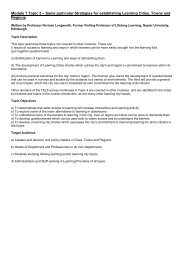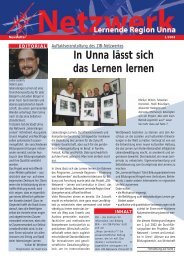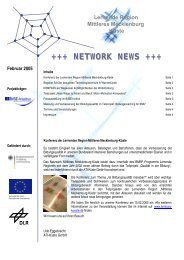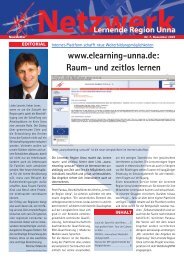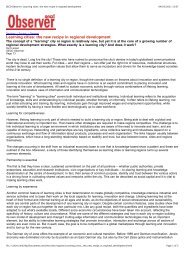SWOT-analysis as a basis for regional strategies - EUROlocal
SWOT-analysis as a basis for regional strategies - EUROlocal
SWOT-analysis as a basis for regional strategies - EUROlocal
Create successful ePaper yourself
Turn your PDF publications into a flip-book with our unique Google optimized e-Paper software.
alance between internal and external <strong>analysis</strong>, <strong>as</strong> well <strong>as</strong> the inter-organisational<br />
questions are further elaborated in connection to learning and partnership in Chapter<br />
4.<br />
As general <strong>as</strong> the problems regarding the necessary balance between internal and<br />
external factors may be, it is, however, not only the <strong>analysis</strong> of the implementing<br />
organisation that may pose problems. Un<strong>for</strong>eseen difficulties or unpredictability<br />
relating to external factors may also emerge. It h<strong>as</strong> been argued in public planning<br />
debates that “any process of choice will become a process of planning (or strategic<br />
choice) if the selection of the current actions is made only after a <strong>for</strong>mulation and<br />
comparison of possible solutions over a wider field of decisions relating to certain<br />
anticipated <strong>as</strong> well <strong>as</strong> current situations” (Friend and Jessop 1969: 110). If, <strong>as</strong> h<strong>as</strong><br />
been argued in the <strong>SWOT</strong> literature, the uncertainty refers to the current situations <strong>as</strong><br />
well <strong>as</strong> to the possible consequences of potential strategic choices, the uncertainty in<br />
strategic choice is inherent to the process of <strong>analysis</strong> itself and can only offer the<br />
planner conditional alternative solutions. This naturally makes the importance of<br />
thoroughly researched and well-founded <strong>SWOT</strong> analyses all the greater. It may also<br />
require making implementation and strategic planning a more inter-woven process,<br />
where planning and implementation are considered <strong>as</strong> part of the same interactive<br />
process (on communicative planning see Sotarauta1996b: 295).<br />
The context question in the strategy <strong>for</strong>mulation stage is sometimes seen <strong>as</strong> secondary<br />
to the contextual nature of strategy implementation. This means that one should<br />
<strong>for</strong>mulate <strong>strategies</strong> objectively, but the degree to which their implementation can be<br />
objective is dependent on the person or organisation implementing the strategy. The<br />
fact that the strategy <strong>for</strong>mulation stage (and the <strong>SWOT</strong> <strong>analysis</strong> <strong>as</strong> an intrinsic part of<br />
it) is not necessarily undertaken by the same person/persons <strong>as</strong> the implementation<br />
stage is often overlooked. In addition, it is <strong>as</strong>sumed that (business) leaders and<br />
executives view <strong>strategies</strong> <strong>as</strong> specific or subjective, whilst researchers apply scientific<br />
objectivity in their implementation of a strategy (Näsi 1991: 28). The art of<br />
implementing a strategy (i.e. deciding on how, and by what means the strategy should<br />
be applied) becomes the area in which these two opposites of subjectivity and<br />
objectivity meet.<br />
In concrete programming work, however, the question of objectivity versus<br />
subjectivity may recede, when the nature of the process becomes more consensusoriented.<br />
In fact the whole methodology of programming work (within the EU<br />
framework or any similar framework emph<strong>as</strong>ising partnership) is likely to reflect the<br />
need to build a stable consensus (European Commission 1999: 44), which makes the<br />
objectivity or subjectivity of the <strong>analysis</strong> undertaken at best a secondary concern.<br />
1.3 <strong>SWOT</strong> <strong>as</strong> part of a learning process<br />
Another important issue to bear in mind when considering the process of strategy<br />
<strong>for</strong>mation within programming work is its nature <strong>as</strong> a continuous learning process,<br />
i.e. <strong>as</strong> learning taking place within regions themselves and their institutional structures<br />
(see <strong>for</strong> instance M<strong>as</strong>kell and Törnqvist 1999). The learning process itself can be<br />
analysed <strong>as</strong> a cycle within which with the four stages of experiencing, reviewing,<br />
concluding and planning are mutually supportive. A strategic planning process cannot<br />
simply consist of undertaking a <strong>SWOT</strong> <strong>analysis</strong> and then going on to implement it.<br />
17



